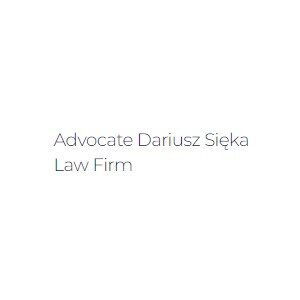Best Discrimination Lawyers in Poland
Share your needs with us, get contacted by law firms.
Free. Takes 2 min.
Or refine your search by selecting a city:
List of the best lawyers in Poland
About Discrimination Law in Poland
Discrimination in Poland is governed by a combination of national laws and European Union directives aimed at prohibiting unfair treatment based on factors such as gender, race, ethnic origin, religion, disability, age, and sexual orientation. The legal framework is designed to promote equality and protect individuals from discriminatory practices in various areas including employment, education, access to goods and services, and social protection. Implementing these laws is crucial in fostering an inclusive society and safeguarding the dignity and rights of every individual.
Why You May Need a Lawyer
Seeking legal advice in discrimination cases is often essential due to the complexity of the legal system and the need for expert interpretation of the law. Common situations where legal help may be required include:
- Discrimination in the workplace, such as unfair treatment during hiring, promotions, or dismissals based on protected characteristics.
- Harassment or prejudice in educational institutions.
- Denial of services in public or private sectors due to discriminatory reasons.
- Unfair practices in housing and accommodation.
- Pursuing compensation or remedies for emotional and psychological harm caused by discrimination.
In these and similar situations, a lawyer specializing in discrimination law can provide guidance, represent you in legal proceedings, and help ensure your rights are protected under Polish law.
Local Laws Overview
Poland's legal framework prohibiting discrimination includes several key aspects that are important to understand:
- Constitution of the Republic of Poland: Ensures equality before the law and prohibits discrimination in political, social, and economic life.
- Labor Code: Outlines equal treatment in employment and occupation, specifying protection against discrimination based on gender, age, disability, race, nationality, sexual orientation, religion, and belief.
- Act on the Implementation of Certain Provisions of the European Union Regarding Equal Treatment: Provides comprehensive measures to prevent discrimination in various aspects of social life, including employment, services, and social security.
- Civil Code: Addresses infringements on personal rights, offering potential remedies for discrimination claims.
- Code of Administrative Procedure and the Civil Procedure Code: Mandate non-discriminatory treatment in administrative and judicial proceedings.
Frequently Asked Questions
What constitutes discrimination under Polish law?
Discrimination occurs when an individual is treated less favorably than others in a similar situation based on characteristics like gender, race, religion, age, or sexual orientation.
Is discrimination only illegal in employment settings?
No, while employment discrimination is well-documented and regulated, discrimination is prohibited in many areas, including education, healthcare, housing, and access to goods and services.
Can I file a discrimination complaint anonymously?
Typically, formal complaints must be filed with identifying information. However, some bodies may offer advice or resources anonymously before formal action is taken.
What evidence do I need to prove a discrimination claim?
Evidence can include witness statements, written communication, company policies demonstrating bias, and any other documentation indicating different treatment based on a protected characteristic.
What measures can be taken against employers who discriminate?
Victims can pursue legal recourse including mediation, filing complaints with labor inspectors, or initiating lawsuits, which may lead to compensation or mandatory corrective actions.
Are there advocacy organizations that can help with discrimination cases?
Yes, several NGOs and human rights organizations provide support, such as the Helsinki Foundation for Human Rights and Amnesty International Poland.
How long do I have to file a discrimination lawsuit in Poland?
The time limit varies by the type of discrimination and applicable laws but often ranges from 1 to 3 years from the occurrence or realization of the discriminatory act.
Can I request support for legal fees if I cannot afford a lawyer?
Legal aid is available for those who qualify, offering free or reduced-cost legal services depending on your financial situation and the nature of the case.
What is the role of the Commissioner for Human Rights in Poland?
The Commissioner for Human Rights acts as an independent institution tasked with safeguarding individual rights, receiving complaints, and conducting investigations into allegations of discrimination.
How are discrimination cases resolved in Poland?
Cases can be resolved through litigation, mediation, and reconciliation efforts. Effective resolutions often involve compensation, policy changes, and commitments to prevent future discrimination.
Additional Resources
For additional support, consider reaching out to the following resources:
- Commissioner for Human Rights: An official body dedicated to protecting citizens' rights.
- Helsinki Foundation for Human Rights (HFHR): Provides legal assistance and education on human rights issues.
- Amnesty International Poland: Offers resources and support for those facing discrimination.
- Anti-discrimination and Equality Officers: Officials embedded within larger organizations to promote equality and address grievances.
- Local Advocacy Groups: Collaborate with NGOs and government bodies to combat discrimination in various sectors.
Next Steps
If you believe you have been a victim of discrimination and need legal assistance, consider taking the following steps:
- Document the Incident: Keep a detailed record of the discriminatory actions, including dates, times, locations, and persons involved.
- Seek Initial Advice: Consult with legal aid services or NGOs that specialize in discrimination for preliminary guidance and support.
- Contact a Lawyer: Engage a lawyer experienced in discrimination law to explore your legal options and receive formal legal advice.
- Pursue Formal Channels: Based on your lawyer's guidance, consider filing a complaint with relevant authorities, such as labor inspectors or equality bodies.
- Consider Mediation: Explore alternative dispute resolution methods like mediation, which can offer a faster and less adversarial approach.
Lawzana helps you find the best lawyers and law firms in Poland through a curated and pre-screened list of qualified legal professionals. Our platform offers rankings and detailed profiles of attorneys and law firms, allowing you to compare based on practice areas, including Discrimination, experience, and client feedback.
Each profile includes a description of the firm's areas of practice, client reviews, team members and partners, year of establishment, spoken languages, office locations, contact information, social media presence, and any published articles or resources. Most firms on our platform speak English and are experienced in both local and international legal matters.
Get a quote from top-rated law firms in Poland — quickly, securely, and without unnecessary hassle.
Disclaimer:
The information provided on this page is for general informational purposes only and does not constitute legal advice. While we strive to ensure the accuracy and relevance of the content, legal information may change over time, and interpretations of the law can vary. You should always consult with a qualified legal professional for advice specific to your situation.
We disclaim all liability for actions taken or not taken based on the content of this page. If you believe any information is incorrect or outdated, please contact us, and we will review and update it where appropriate.
Browse discrimination law firms by city in Poland
Refine your search by selecting a city.
















